|
| |
Gaia II
|
|
While I earn my living from commissions and residencies, my personal work is a celebration of those who work for peace and justice. Since 2007, I have been creating iconic portraits of women, representatives of Gaia, the community of the living earth. These portraits celebrate the diversity of life through the efforts of women around the world who work to protect life.
In Gaia II, nine paintings address issues of food and water security. The women come from diverse places and backgrounds. Some are well known, some are unknown outside their neighborhood. Some are poor, some are highly educated professionals. They are united by their efforts to protect life and promote peace and justice.
The titles and accompanying poems explain some of the imagery within the paintings. The people whose faces you see have all been affected by the extraction and exploitation of petroleum in all its many forms. The paintings celebrate those in resistance to the plunder and profit of corporate petroleum in its many forms. They are both portraits of individual women and icons of worldwide resistance in many forms.
Gaia II paintings are acrylic on unprimed floor canvas, and each measures 60" x 28". |
|
|
|
|
Acknowledge the Sacredness of Life |
|
Tsering Dolma Gyaltong, Tibetan in Exile, is one of the Council of Thirteen Indigenous Grandmothers. Some confront the destruction of earth with demonstrations. Others, like the thirteen Grandmothers, undermine the ideology of continuous development through the sharing of traditional communal healing practices and prayer.
For Gyaltong, the dumping of uranium wastes in Tibet's sacred lakes epitomizes the greed and insanity of the Industrial Empire. Destroying safe water for the sake of profit, threatens life. Destruction of the rain forests, the prairies, the tundra, the desert, the salmon runs all threaten the sustainability of life on the planet. Indigenous traditions call us back to knowledge of our essential self interest in maintaining healthy earth systems. |
|
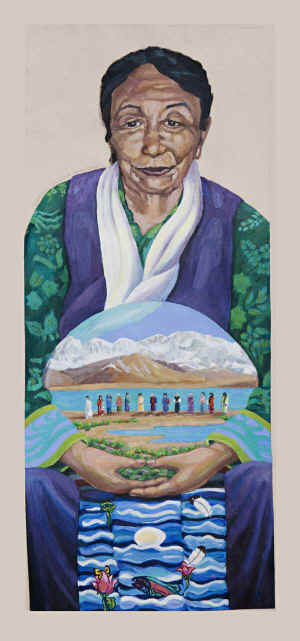
|
|
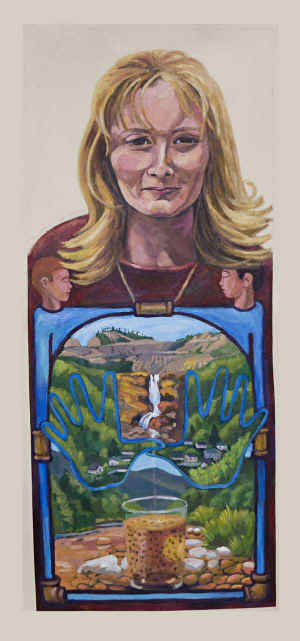 |
|
Demand Justice |
Corporations know no shame. They can blow the top of a mountain, turning rivers and wells into a slushy confetti of toxic metals, but they will not acknowledge fault or share in the cost of reconstructing that which they have destroyed. It seems a simple request, here in West Virginia, or in the mountains of China, that parents would want safe water for their children. For the Corporation, none of our children measure into the cost of doing business. You may be able to shame a local government into providing safe piped water- if you bring Big Coal to a court of justice. But the corporations and finance companies that invest in them will not admit fault.
Jennifer Hall Massy and her neighbors have sued the companies practicing the mountaintop removal mining. Public pressure has forced local governments into providing piped water to replace wells. |
|
|
|
|
Nourish Resistance |
|
In cities of the Andes, the descendants of those who invented agriculture now subsist on rations of food imported from the industrialized north. Driven off terraces farmed by hand, into the urban slums, poor women band together to feed their communities through community kitchens.
They share ration cards in order to purchase more of the basics. They nurture their strength with food so they can go into the streets to demand the right for housing and education.
Maria Haunanay is president of a community kitchen. in Lima Peru. She is a speaker of social literacy, of the knowledge that all of us matter and have a right to food, that all of us must be counted and remembered. Ancient Andean language was written with a visual and tactile system of knots. She writes a peoples history with meals. |
|
|
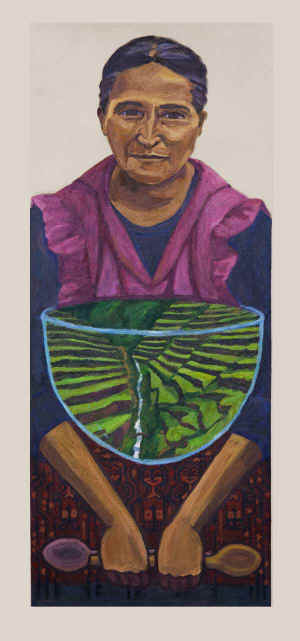
|
|
|
Organize from
the Ground Up |
When the auto jobs dry up, when the labor unions fail, those who used to have jobs can still join the Union -- of the Poor. When people join together their strength is magnified. When the city shuts off the water, a single mother is afraid to complain. Her children may be taken away because the waterless home is a health risk.
The same City that cannot find ways to help low income residents manage water bills, can envision selling its water to private interests to sell for private profit. One person can offer the lawn hose to the next house. A temporary solution.
Marion Kramer organized the water-denied of Detroit's formerly employed residents and their compassionate neighbors to demand access to Water. |
|
|
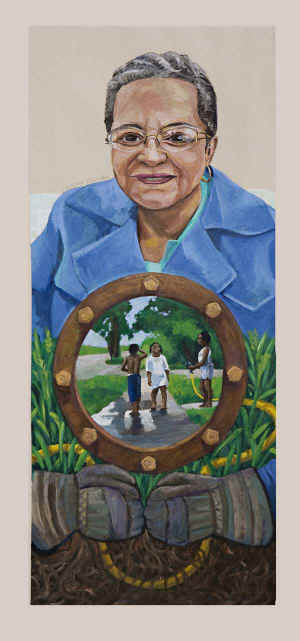
|
|
|
|
|
Practice Democracy
|
Centolia Maldonado Vasquez and the Indigenous Communities of Oaxaca, Mexico struggle to maintain traditional agricultural practices, craft knowledge, and community social structures, including language.
Through The Binational Front of Indigenous Organizations, they are stretching their culture - rights and responsibilities - from Oaxaca, to Baja, to California and Washington. All members have a right to find livelihood while continuing to perform their responsibilities to the community.
Weaving of hats and bags of palm fiber, and clothing of cotton and wool uses traditional knowledge, sustainable practices for maintaining life. Palm fibers wear out, becoming compost. Replacing hats for sun protection and bags for storing and moving goods, is a small scale livelihood for community members. Production of traditional clothing by weaving is time-intensive. Traditional patterns and designs mark one's place in the community. The consumptive culture of the global economy dumps plastic bags, and second hand clothing from wealthy nations into the peasant communities.
Forest and mineral extract companies, the military, tourist industries, find ways to appropriate communal land once used for food. As people are forced into towns and cities, they are forced to adopt the dominant cultures- trading palm bags for plastic, and the weaving of clothes for jobs in sweatshop. The US military has recently been partnering with US and Mexican Universities to map the mountainous area. A benign offering to local people? A data base for Extractive Industries? A data base for police and military surveillance? |
|
|
|
|
Remember |
| Remember, or relearn, the practice of food production, harvest, storage- how to do it with your own hands- how to feed your family.
Remember to honor those who have that knowledge and practice those basic skills. Those are the people who know how to sustain life.
Remember peoples history, the true stories of how and why.
Icon for Via Campesina, an international organization that works (by consensus) to promote the concept of food sovereignty for all people in all ecosystems of earth.
Once upon a time - peasant agriculture and the family farm rooted in the soil fed entire regions and cultures with food.
The Cash in and Burn methods of Industrial agriculture destroy the soil, local economies, and communities.
Once upon a time - the fish harvest of Ethiopia provided protein for local people. Now in the global economy of cash markets, the fish of Africa goes to Europe. The magic hidden in the berries of native trees was immortalized in legends. Now we have Ethiopian Mocha Harrar at Starbucks. Arable land, that might grow food, is used to grow coffee for international trade. |
|
|
|
|
|
|
|
|
Share Knowledge
|
That which is sacred must be protected.
That which is sacred cannot be bought and sold.
The knowing of seeds is sacred.
Knowledge is a sacred trust.
Knowledge must be used to protect life.
Sacred knowledge inspired the forest women of India to protect the trees. Their example inspires others to a forest of resistance to protect the seeds that sustain life.
Vandana Shiva, cofounder of Navdanya, fights against the Biopiracy of gene and seed patenting by multinational corporations. She is a champion of four aspects of Earth Democracy-Seed sovereignty, Food sovereignty, Water sovereignty , Land Sovereignty. She was inspired to activism by the Tree Huggers of Northern India. The power of truth is with these women. Shiva is a physicist, by university training.
The pattern in her scarf is a traditional design, a single line drawn by hand, that local children learn as part shared culture owned by all. in academic lingo the pattern is fractal. Because a computer can reproduce the pattern, does the computers owner have the right to patent the design? Can communally knowledge be privatized? Global corporations and the supreme courts they purchase would say yes. Global Corporations claim patent on traditional knowledge of seeds and medicines. Their courts enforce laws requiring people to purchase what was once their own knowledge and produce. Human rights of common ownership. and the concurrent responsibility to protect forest, farmland, water resources must be sovereign over Corporations needs to sell for profit. |
|
|
|
|
Walk the Talk |
| Four hands and one ax can block a road, can stop log trucks without ever touching them.
In the silence when the machines stop, one can listen to trees.
They are not mere sky walkers. They are soil holders, water savers, protectors of animals, one form of which is human.
Native, First Nation, Indigenous Peoples, human land - it is all the same. For the Corporations, its resources are easy picking, if no one is listening, if no one is watching. If no one is willing to block the road.
Chrissy Swain and her sister began effective protest against illegal deforestation of Grassy Meadows Land by blocking the access road. since then she has become a speaker for the rights of her people and of the Grassy Narrows land in Ontario, Canada |
|
|
|
|
|
Rethink |
| Rural Tibetan Communities in the Himalayas were once food, shelter, health and culture self-sustaining. Children learned essential skills. There was time and energy to create and support remarkable achievements in philosophy, architecture, landscape architecture and arts. Then came the roads, and Bollywood entertainment, and tourists, and education and jobs.
A mythology of Continuous Economic Development is imbedded in our culture. Its sources and tendrils are many and hard to root out. It does not describe a living cycle. It is a fantasy repeated so often that we no longer recognize its lethal underpinnings. It is an infection shared by good meaning people as well as by the greedy hounds that promote it for personal gain.
Helena Norberg-Hodge, of the International Society of Ecology and Culture, rethinks those assumptions and teaches others how to independently analyze the effects of our choices. |
|
|
|
|
|
|
|
|
|
|
|
|
|
|
|
|
Used Motor Oil Drawings from the Series "Endangered Species"
|
|
|
|
|
|
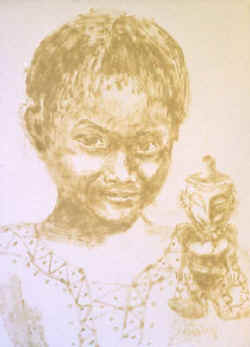
|
|
Colombia
28" x 22"
Used motor oil on paper |
|
|
|
|
|
Alaska
28" x 22"
Used motor oil on paper |
|
|
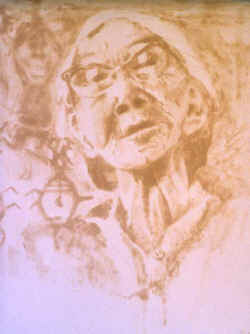
|
|
|
|
|
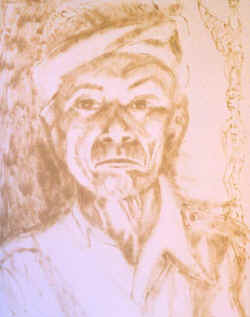
|
|
Indonesia
28" x 22"
Used motor oil on paper |
|
|
|
|
|
|
Tajikestan
28" x 22"
Used motor oil on paper |
|
|
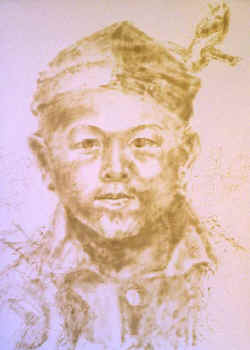
|
|
|
|
Click on images to see detail |
|
|
|
|
|
|
|
|
|
|